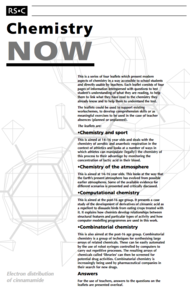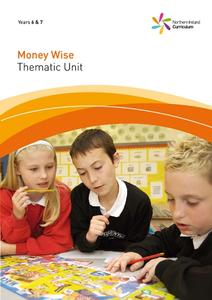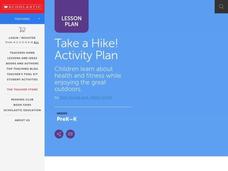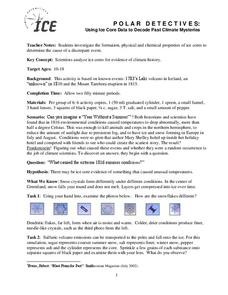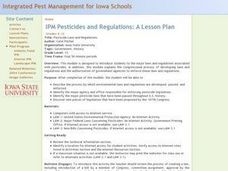Curated OER
Selecting the Tap: Water Safety
Examine water as a scarce natural resource instead of taking it for granted. Middle schoolers identify the traits of potable water, and research local water sources to determine if they are impaired or not.
Royal Society of Chemistry
Computational Chemistry—Chemistry Now
Can some plants make their own animal repellents? Science sleuths examine the properties of cinnamamide in pear trees using an case study about computational chemistry. The resource discusses how vital computers are to research, how...
National Institute of Environmental Health Sciences
A Student Exploration of the Impacts of Climate Change on Human Health in the United States
Let the data drive the science. Learners examine data provided in resources to discover connections between climate change and health of vulnerable populations. They study trends and present findings using their choice of projects.
Northern Ireland Curriculum
Money Wise
Does money seem to slip through your middle schoolers' fingers? Encourage them to examine spending, saving, and budgeting habits with a unit on consumer skills and money management. Young spenders study the waste that occurs with school...
Teach Engineering
Air Under Pressure
Introduce your class to air masses and how they affect the weather with a lesson that focuses on the differences between high and low air pressure systems. The class explores actual weather data using archived weather data.
Curated OER
Take a Hike!
Students explore the benefits of staying active by going on a hike. In this physical education lesson, students discuss the concept of a hike, where a good place to hike is and what types of foods are necessary to stay nourished....
Polar Trec
Polar Detectives: Using Ice Core Data to Decode Past Climate Mysteries
How does examining an ice core tell us about weather? Learners set up and explore fake ice cores made of sugar, salt, and ash to represent historical snowfall and volcanic eruptions. From their setups, scholars determine what caused the...
Learning Games Lab
Testing and Adjusting pH
Pupils learn how to control food spoilage by adjusting the food's pH. They see that one of the most dangerous bacteria can grow in food if people don't handle and store food properly. Using knowledge of the bacteria's preferred pH,...
Consortium for Ocean Science Exploration and Engagement (COSEE)
One Ocean: It Matters!
Here is the first of four poignant lessons on how humans and oceans interact, even if people live far from the coast. This particular lesson also examines studies that are taking place in Antarctica of how climate change is affecting the...
Beyond Benign
Solvent Snapshot
Discover the properties and purpose of chemical solvents. Continuing with the theme of shampoo ingredients, the 10th lesson of this 24-part series investigates the choice of solvents in shampoos. Through their exploration, they learn how...
Beyond Benign
Decision Graphic Introduction
E is for economics, environment, and social equity. The fifth installment of a 15-part series has scholars first considering ecological impacts, such as determining how much water it takes to produce a can of soda. They then use decision...
Beyond Benign
12 Principle Match Up
Can you find a match? Scholars review the 12 principles of green chemistry by playing a matching game. The second lesson of the series reinforces the principles from the first lesson. Individuals play the matching game and also complete...
Nuffield Foundation
Monitoring Water Pollution with Invertebrate Indicator Species
Healthy invertebrates mean healthy ponds. An outdoor activity has scholars collect samples of invertebrates from local lakes or ponds. They identify and count different species and use the information to estimate the level of pollution...
American Museum of Natural History
Theodore Roosevelt's Outdoor Adventures
Time for a virtual sightseeing trip. Pupils explore the Grand Canyon, Devil's Tower, and Yosemite Valley in an interactive online experience. They answer questions about the organisms in each location and draw conclusions based on their...
Howard Hughes Medical Institute
Evolution in Action: Data Analysis
An environmental factor, such as a drought, sometimes speeds up the rate of natural selection. Scholars analyze data on the beaks of birds around the time of the drought. They compare those that survived to those that perished and find...
Howard Hughes Medical Institute
Mendelian Genetics, Probability, Pedigree, and Chi-Square Statistics
People with the sickle cell trait, but not sickle cell disease, find natural protection against malaria. Scholars consider various combinations of genotypes and environmental factors to determine if children might have sickle cell...
British Council
Upcycling
It's time for a new life! Scholars learn what it means to give products new life by upcycling. They complete a crossword puzzle, read and discuss an article, and play a game about upcycling ideas.
Curated OER
Pesticide Laws and Regulations
Students explore the laws and regulations of pesticides. In this pesticides lesson, students research how laws are made and identify the agencies responsible for enforcing the laws. Students research the Internet for laws and bills...
Curated OER
Sustainable Island Development
Students explain how the basic human needs of a large group of people can be met. They describe and evaluate alternative methods for providing water and food, producing electricity, handling wastes, and transporting goods and people....
Curated OER
Guidebook
Students create a guidebook page about a plant on the school grounds. In this life and plant science lesson plan, students identify plants around the school, then research the plant and write a narrative about it. Students publish the...
Curated OER
Understanding Biodiversity Via Ecological Footprints
Sixth graders investigate the ways in which human beings impact the environment and ecology through the calculation of their own ecological footprint, discussion questions pertaining to biodiversity and potential imbalance hazards, and...
Curated OER
Greenhouse Gases: The Chemistry Behind the Culprits
Ninth graders investigate the effect of different gases in the atmosphere. In this chemistry lesson, 9th graders explain how these gases contribute to global warming. They suggest possible solutions to this growing problem.
Curated OER
The Effects of Trash and Garbage On the Environment
Students recognize the importance of solid waste management. In this science lesson plan, students analyze individual solid waste management habits as they enhance their knowledge of solid waste disposal and the recycling process.
Curated OER
The Three Gorges: Should Nature or Technology Reign?
Students participate in a debate regarding the Three Gorges Dam in China. In this research skills lesson, students prepare for a debate regarding the construction of the Three Gorges Dam in China. Students participate in the dam taking...

